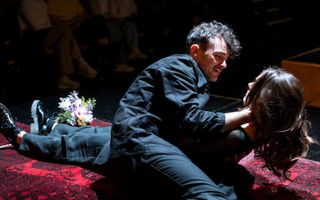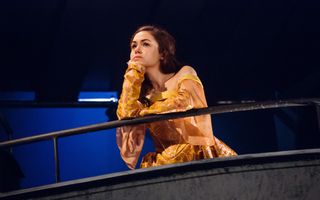 On Stage
On Stage
Fate and Foreshadowing
In Romeo and Juliet, foreshadowing begins with the first lines of the play in the prologue where the authoritative voice tells us unmistakably what will happen: “A pair of star-cross’d lovers take their life.” This motif then reoccurs throughout the play. On his way to the masquerade ball, Romeo says “My mind misgives some consequence yet hanging in the stars” (Act 1, Scene 4) and when fate delivers this consequence, Juliet’s supposed death, he curses it, “Then I defy you, stars”. (Act 5, Scene 1) When Romeo murders Tybalt just after his marriage to Juliet, he feels that the events are so desperately unlucky that destiny has made a fool of him, “O, I am fortune’s fool”. (Act 3, Scene 1) When Romeo is climbing down Juliet’s balcony after their wedding night before he escapes to Mantua, Juliet says “Methinks I see thee now, thou art so low, as one dead in the bottom of a tomb”. (Act 3, Scene 5) Romeo is literally below her, but her mind can’t help but view the image as something more ominous. The Friar also unknowingly predicts where the lovers’ relationship is heading, and pinpoints the fatal inevitability of such intense and pure young love, saying “These violent delights have violent ends” (Act 2, Scene 6). Literary critic Harold Bloom agrees and states that Romeo and Juliet is, ‘an uncompromising, mutual love that perishes of its own idealism and intensity.’ It is not mere chance or the stars that have fated them but the very nature of youthful, idealistic love.
Despite all, fate, choice and all-consuming love are just three factors that are generally cited as reasons for the lovers’ tragic ends, along with the parents, their feud, time, hasty actions, and more. A critic from the 1800’s, William Hazlitt, felt that Shakespeare ‘founded the passion of the two young lovers not in the pleasure they had experienced but on all the pleasures they had not experienced’; the excitement lies in its potential. In his book Shakespeare’s Language, Frank Kermode says that he feels there is ‘no moment when we are allowed to think that permanence or happiness is part of’ the lovers’ relationship. Ironically, the only time Romeo decides to escape the fate of being “fortune’s fool”, “and shake the yolk of inauspicious stars,” he buys a poison, drinks it, dies, and literally sets his fate in stone (or gold as the statues erected in Romeo and Juliet’s honour are said to be).
Love and Hate
Love in the play is presented in contrasting ways. Many theorists believe that Romeo’s self-interested conceits at the start of the play are not worth our sympathy. However, Romeo shifts from fanciful love with Rosaline to something much more real with Juliet, and his use of language follows suit; from lofty distant poetry to connected active dialogue.
Even the family feud or hatred is presented on opposing levels. The action begins with the comical cursing of the Capulet and Montague servants, which is soon contrasted by the more serious, heightened swordplay of Tybalt and Benvolio. Romeo’s opening lines reflect the inconsistent nature that is inherent in this type of familial feud and the interconnectedness of love and hate; “O brawling love! O loving hate! O anything, of nothing first create! O heavy lightness! serious vanity! Misshapen chaos of well-seeming forms!” (Act 1, Scene 1) Northrop Frye states that for Romeo and Juliet, ‘their great love and their tragic death are bound up together as aspects of the same thing’ and that in this example, Romeo is using a union of opposites that express the complexity of this dilemma, and the confusion that results. In many ways the same ‘hot-blood’ seems to fuel both love and hate to their bitter ends. Love can’t avoid hate in this play. Romeo, who seeks to end the fighting, and goes as far as to accept Tybalt as family, is ironically forced into a situation where he must fight, and kills Tybalt.
The love of Romeo and Juliet is also contrasted greatly to the indecent musings of Mercutio. Harold Bloom even suggested that Shakespeare had to be rid of the charming, powerful and crude Mercutio and his ideas on love, in order to make way for the two protagonists.
Youth and Age
In Romeo and Juliet the youth seem to exist in a separate realm to their parents and their customs are not understood by the older characters. It could be said that Juliet’s parents don’t really know who the real Juliet is, and the audience have a rather better idea. In fact, the lovers and their parents don’t even start the play aligned with one another, and the distance between them only continues to increase. The feud may have been begun by the older generation, but it is currently being fueled and acted out by the youth. Despite their vocal vitriol, Lord Capulet and Lord Montague are rarely involved physically, are not violent, and at times even attempt to suppress the feud. Capulet even says in Act 1, Scene 2, “’tis not hard, I think, for men as old as we to keep the peace.”
Despite their social, political and familial authority, both sets of parents are unable to control the youths in either love or hate. The very nature of youthful love is fraught with extreme behaviour. In her introduction to the Oxford edition of the play, Jill Levenson states that, ‘although writers since antiquity have recognised and recorded the experience of adolescence, none had dramatized it so comprehensively’ as Shakespeare. As an audience we see Romeo change from melancholy to the height of first love, and from despair to calm. The authorial or adult figures are meant to represent all that is “wise and slow” as the Friar advises, yet their actions are also fraught with foolishness, sometimes more so than the clear-headed lovers. Both the Friar and Capulet plan weddings without much thought, and Capulet is especially quick to anger when he does not get his way. It is the youths who manage to transform themselves, and we observe their speedy growth. While Romeo grows in character and fortitude, it is Juliet who grows exponentially, from a girl to a mature, worldly woman in just three short days.
Dreams and Reality
The youth of the play seem to have an innate awareness that love in all forms can be fraught and fleeting, and they seem to experience or discuss this in relation to dreams: “I dreamt my lady came and found me dead” (Act 5, Scene 1), “I dreamt a dream tonight… That dreamers often lie” (Act 1, Scene 4), “asleep where they do dream things true.” (Act 1, Scene 5) The Queen Mab speech discusses the power that love has over our dreams, and then Mercutio turns these dream-like images into a nightmare.
This contrast and mixture of illusion and reality blurs the lines between the daylight world and the dream-like state. The young lovers form their connection at night and, like the Queen Mab speech, supposedly carry their dreams with them into the light of day. It is as if the youth are witnesses to an order of things that matter more than the sunlit reality, or that perhaps they should be wary in the night because things might not be real. As Romeo says at the height of new love in the balcony scene: “O, blessed, blessed night! I am afeared being in night all this is but a dream, too flattering sweet to be substantial.” (Act 2, Scene 2)
Language
Romeo and Juliet has an incredible range in style and content from sublime poetry and courtly verse, to casual modern prose and filthy humour. The play’s language is rather rhetorical in the beginning and moves from verse into prose as the action progresses. This is especially true of the lovers. The only time Juliet returns to rhetoric is when she curses Romeo for the death of Tybalt. Theorists believe that Shakespeare clashes these styles of language deliberately. Romeo and Juliet’s beautifully intimate goodbyes contrast with the Nurse and parent’s dramatic and formal lamentations. “O woe, O woeful, woeful, woeful day”. (Act 4, Scene 5) At a certain point in the play, in all aspects, the lovers become very separate from the rest of the action and characters, and their language mirrors this.
The sonnet form, used for the prologue and throughout the play, functions to remind the reader of love’s formalities, yet challenges them at the same time. The young lovers flirt within the sonnet structure at the ball and then begin to engage in casual and connected prose. Juliet at times still wishes she was shielded by these formalities, such as when she says during the famous ‘balcony’ scene “fain would I dwell on form”. (Act 2, Scene 2)
Dramatic Irony
Dramatic irony and the audience relationship are vital components of Romeo and Juliet. Shakespeare carefully exposes each character to particular knowledge of the events of the play, at precisely chosen times, whilst allowing the audience to always be an omniscient overseer of the action. In this way, the audience always knows more than the characters on stage, yet is unable to comment on the action or alert them to any misfortune. This technique works to build tension, creates conflict through miscommunication and instantly endows the audience with authority. As the audience are complicit with the young lovers’ heartache and choices, they are invited to empathise with them on a more personal level. Only the Friar, Nurse and the audience are privy to the marriage and relationship of Romeo and Juliet.
Both Romeo and Juliet are faced with several situations in which they are forced to keep their love secret. For instance, when Romeo is faced with Tybalt’s challenge he states: “The reason I have to love thee doth much excuse the appertaining rage to such a greeting… till thou shalt know the reason of my love.” (Act 3, Scene 1) He cannot fight Tybalt because they are now related, but he can’t let Tybalt know the reason for his submission. Only Romeo and the audience are aware of his predicament, and they observe how his silence has horrifying consequences for those around him, most notably Mercutio. Similarly, when Juliet’s parents inform her that she must now marry Paris, the audience are aware that she is already married, but her parents cannot understand her defiance. Again the audience share Juliet’s struggle as she fights her parents, is rejected by the Nurse, accepts the potion from the Friar, and is isolated in her fight to preserve her love with Romeo. Before Juliet drinks the potion, she must present a brave face to her parents and states: “Henceforward I am ever rul’d by you.” (Act 4, Scene 2) Only the audience is aware of her false performance and the high emotional stakes of the situation she is in.
Soliloquies are an important element of dramatic irony in this text. Shakespeare affords his audience several intimate moments with both Romeo and Juliet in which they can share their joy, pain and personal struggles. The audience are made aware of their thoughts or inner monologue. Romeo shares his love for Juliet with us: “It is the east and Juliet is the sun” (Act 2, Scene 2) and Juliet shares her fear of consuming the potion “I have a faint cold fear thrills through my veins” (Act 4, Scene 3). Shakespeare also utilises asides at several moments throughout the text in order to maintain the relationship between the title characters and the audience. When Juliet is informed that Romeo is in fact a Montague, she shares her realisation; “My only love sprung from my only hate” (Act 1, Scene 5). Similarly, Romeo discusses his relationship with Mercutio with the audience: “He jests at scars that never felt a wound” (Act 2, Scene 2). At times the audience are more aware of events than the title characters. When the lovers first meet at the ball they speak to each other, kiss, and are about to exit before being made aware that they are actually enemies. The audience however are privy to this from the very opening chorus of the play. Similarly, when Juliet is anxious of Romeo’s arrival to her bed-chamber she says hopefully; “Gallop apace you fiery footed steeds” (Act 3, Scene 2). Juliet is unaware of the fight that has just taken place, and that Romeo has murdered her cousin, or that he has been banished. The audience ironically observe her joy whilst in full knowledge of the impending doom that awaits her.
Shakespeare’s most brilliant use of dramatic irony in this play is, of course, Juliet’s false ‘death’ and the timing of Romeo’s arrival to the tomb. The audience are in full knowledge of Juliet’s plan and they watch her closely, waiting for signs of her waking, as Romeo drinks his poison and dies beside her. She wakes just as he has passed away. There have been many instances during productions of Romeo and Juliet, where audience members have actually called out to the characters on stage, so emotionally involved in the action that they try and stop the tragedy unfolding before them.
Comedy and Tragedy
In classic drama, a play was classed as either a comedy or a tragedy, but in Elizabethan drama there was a brand new notion of ‘comic relief.’ This was something many European audiences found intolerable. In the 1700’s, Voltaire criticised Hamlet as being ‘the work of a drunken savage for its blend of sublime passages with witless vulgarity.’
Romeo and Juliet contains Shakespeare’s most inspiring love poetry, but is also his filthiest play in regards to comedy. Comedy of various kinds is provided by the Nurse and Mercutio, and this offers a balance to the intense tragedy that dominates the second half of the play. In fact, for the performers and audience, the play feels more like a comedy in the first half and a tragedy in the second. Many believe that Shakespeare is again working with opposites, exploring the relationship and boundaries between comedy and tragedy. It has often been said that if Romeo and Juliet had taken a slightly different tone with the lover’s predicament, it would have turned into A Midsummer Night’s Dream.
Northrop Frye believes that ‘Romeo and Juliet has more sparkle and wit than any other tragedy… so much that we may instinctively think of it as a kind of perverted comedy. It may be described as a type of comedy turned inside out.’
Space
Shakespeare very astutely uses the device of space in Romeo and Juliet to create a sense of increasing tension as the fate of the two young lovers unfolds and the stakes continue to rise. The play starts in the town square, a very open, public communal setting and most of the action in the first half occurs in such a manner: for instance, the opening brawl and the Capulet ball. As the second half of the play unfolds, the space in which the action occurs continues to decrease. The drama moves to the interior rooms of the Capulet house, to the Friar’s cell, and then concludes in the confines of the Capulet tomb. This technique not only personifies the increasing stakes, but also highlights the ever-growing isolation of the lovers from the rest of society.
Time and the timeline
Time also plays an extremely important role in the play, and has a very interesting relationship with the notion of fate. Shakespeare uses this dramatic device in order to compress the events of the play into just three and a half days. Time seems to be the vehicle in which fate runs its course; they parallel one another. The lovers have very little time with each other. Romeo and Juliet fall in love immediately at the ball, profess their love in the ‘balcony’ scene, marry in a brief ceremony, then spend one night together before Romeo is banished to Mantua. Romeo and Juliet fight or constantly try to manipulate time. Juliet yearns for night to “Gallop apace” (Act 3, Scene 2) and ironically time certainly does race, until it tragically runs out. Again we see the young couple’s freewill fighting with a society, world and history beyond their control. Juliet even argues with time’s cruel hand, bemoaning that she should find out that Romeo is her enemy after she falls for him, saying “Too early seen unknown, and known too late!” (Act 1, Scene 5).






